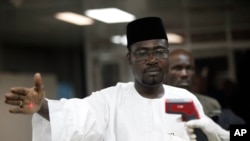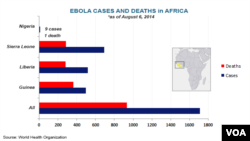Nigeria confirmed two more Ebola cases Friday and said six other new patients are showing symptoms. Despite the outbreak, Nigerian officials are calling on Saudi Arabia to keep its borders open to Nigerian Muslims for this year's pilgrimage to Mecca, after the Kingdom suspended thousands of visas in other countries in West Africa.
As Saudi authorities prepare for this year's Hajj in October, they have suspended visas for thousands of Muslims in Guinea, Sierra Leone and Liberia due to the Ebola outbreak.
Over 900 dead
The outbreak began in February and has killed more than 900 people in the three West African countries. Nigeria's first Ebola death was on July 25. A second - a nurse that treated an infected Liberian-American visitor - died on Tuesday.
Health Minister Onyebuchi Chukwu says the government is taking extraordinary measures to stave off the spread. And so he is calling on Saudi officials to allow Nigerians, about half of whom are Muslims, to perform the holy pilgrimage to Mecca.
"I've reviewed the situation and I feel if we screen everybody that is inbound and we can work with the authorities of Saudi Arabia, who I expect to also do their own screening at the point of entry," said Chukwu.
But he did call on authorities to have medical experts monitoring all large-scale religious events in countries with Ebola. The virus spreads through bodily fluids, and while most casual contact can not make a person sick, crowded venues could increase the risk.
No ban
Saleh Okenwe, with the National Hajj Commission of Nigeria, says he expects to fly tens of thousands of Nigerians to Mecca as planned.
"Just a few days ago we received a password for processing the Hajj visas from the Saudi authorities," said Okenwe. "So there is no cares of banning Nigerians from participating in Hajj because of Ebola."
Khalid Abubakar Aliyu, the secretary general of Jama'atu Nasril Islam, a prominent Islamic organization in Nigeria, says as a religious leader, he is far more concerned about the health crisis than the Hajj.
"We hope God will help us stop it there so it didn't really move. But really, we have to be really very careful," said Aliyu. "We hope before the operation, things would normalize and we'd go on."
Aliyu says the government appears to be working fast and he has hopes the Ebola will spread no further in Nigeria, or out of Nigeria.
Unprecedented
This is the first time Ebola has affected West Africa since the disease was identified in 1976. International medical experts are calling this outbreak unprecedented. The World Health Organization has declared it an international health emergency.
The disease spread to Nigeria in July, when Patrick Sawyer, a Liberian-American financial consultant, flew from Liberia to Nigeria and died of Ebola in Lagos. It was the first time the virus has been known to cross an international border by air. Since then, the other Ebola patients in Nigeria have all been people who came into direct contact with Sawyer.
On Wednesday, a man in Saudi Arabia died after traveling to Sierra Leone on a business trip, raising fears that Ebola may have traveled by plane again, and this time to another continent.
Ibrahima Yakubu contributed to this report from KADUNA.






